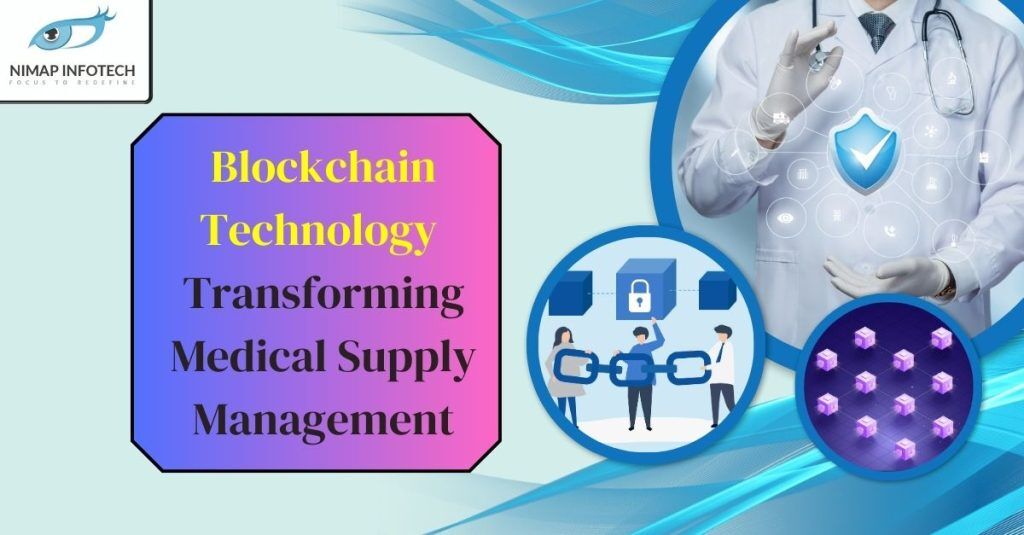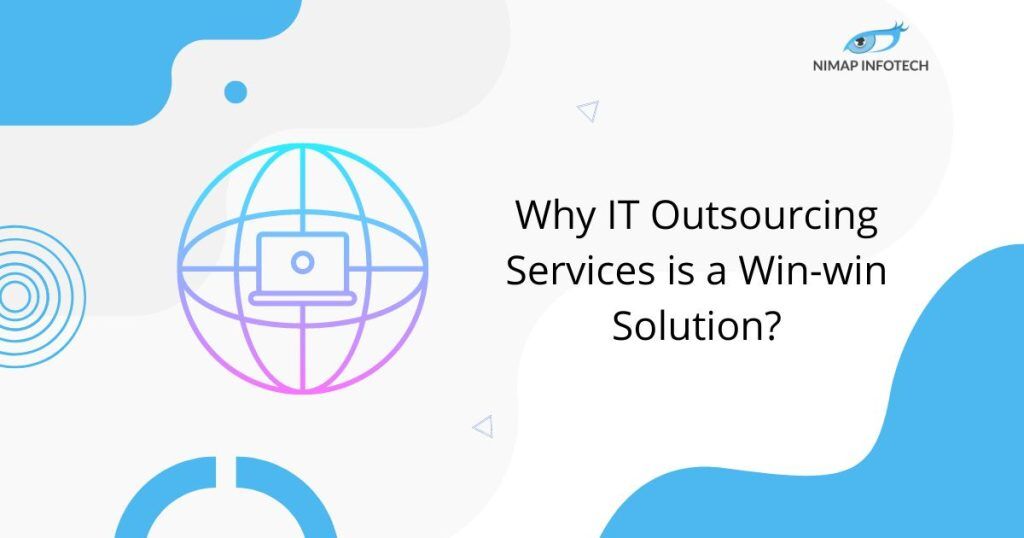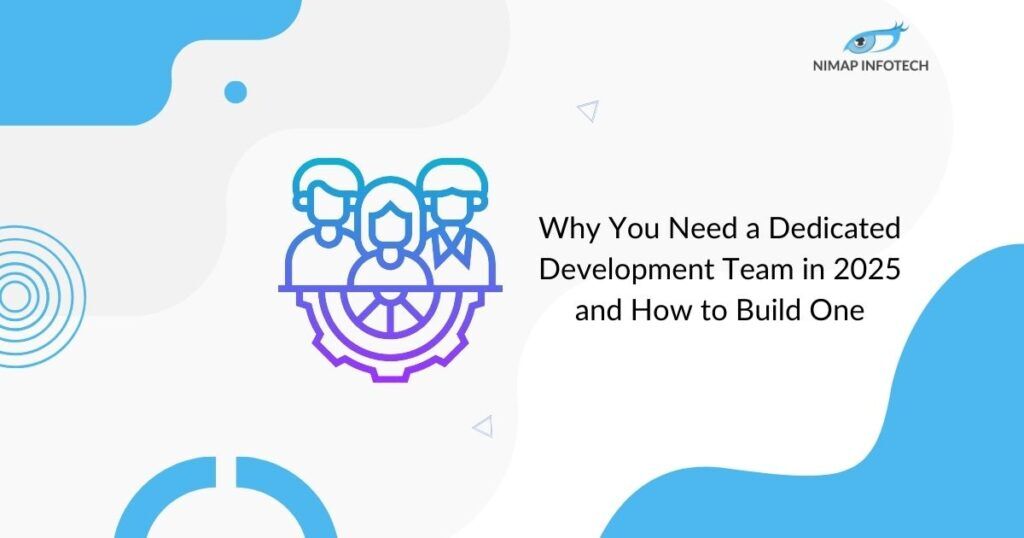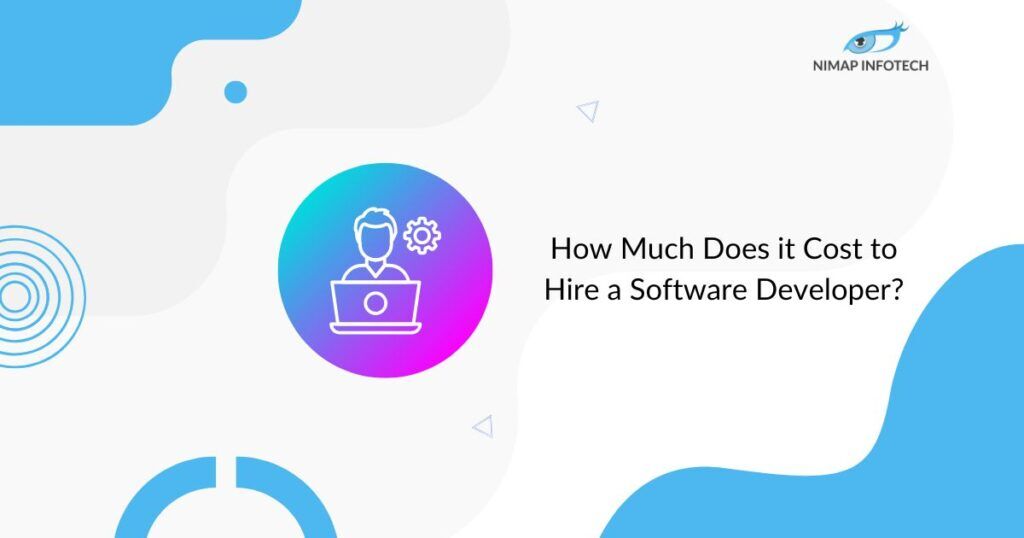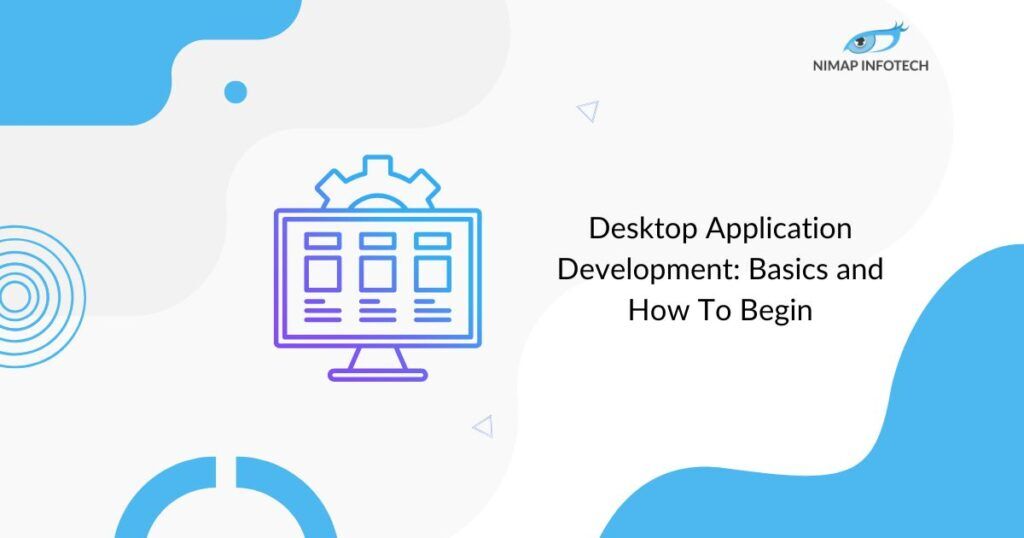Blockchain technology improves healthcare supply chains, enhancing data integrity, security, and authenticity, benefiting the sector.
You can learn all there is to know about blockchain in the healthcare supply chain by reading this article. We are going to discuss the advantages of blockchain-based medical supply chain software and show you how medical supply chain companies may use blockchain technology to streamline their operations.
Table of Contents
ToggleWhat is blockchain technology in healthcare?
A decentralized, distributed technology called blockchain makes it possible to store and move data in a transparent, safe manner. Healthcare utilizes blockchain to establish a secure system for storing patient data.
Healthcare companies can employ blockchain to create an unchangeable patient data record, easily accessible and shareable by authorized parties. This can assist in lowering the possibility of data breaches and guarantee the confidentiality and security of patient data.
The administration of Electronic Health Records (EHRs) represents one of the most exciting applications of blockchain in healthcare. Healthcare companies can establish a secure, decentralized, and interoperable patient data exchange system by utilizing blockchain for storing and managing EHRs.
Features of blockchain-based supply chain management software:
Blockchain-based software for managing the medical supply chain enhances security and efficiency in the healthcare industry. These characteristics consist of, among others:
Immutability:
- The immutability of the blockchain-based medical supply chain management system is essential.
- After recording information on the blockchain, it becomes immutable and remains unchangeable.
- This feature reduces the likelihood of data breaches or manipulation by guaranteeing that the data is secure, accurate, and dependable.
Transaction history:
- Blockchain enhances medical supply chain transparency by granting all stakeholders access to comprehensive transaction histories of drugs and medical devices.
- This transparency prevents fraud, waste, and corruption in the supply chain.
- Patients can verify the legality of the products they get, and it improves responsibility across the entire supply chain.
Smart contract:
- We create self-executing smart contracts on the blockchain solution.
- Based on predetermined parameters, we can actively complete automated operations like payments or product delivery.
- In the medical supply chain, smart contracts automate tasks like verifying goods’ legality and ensuring legal compliance.
Also Read: How Mobile App Development Benefits Healthcare Sector
Tracking:
- Easy tracking is one of the key benefits of using blockchain in the software for the medical supply chain.
- The blockchain actively tracks the location and status of the product as it moves through the supply chain.
- Blockchain in the medical supply chain promotes transparency by allowing all stakeholders to access the complete transaction history of drugs and medical devices.
Regulatory Compliance:
- The blockchain-based medical supply chain ensures regulatory compliance by adhering to regulations, including the FDA’s track-and-trace guidelines.
- By adhering to regulations like GDPR and HIPAA, the healthcare industry can meet its legal obligations and protect against counterfeit products.
Patient verification:
- The identification of patient records in the medical supply chain is also possible with blockchain technology.
- The blockchain can be actively searched for the product’s complete transaction history after it has been delivered.
- Openness in healthcare enhances patient safety and credibility by allowing patients to verify product legitimacy and regulatory compliance.
Record keeping:
- Pharmaceutical and medical device manufacturers enter product details (composition, expiration date, batch number) onto the blockchain.
- The network’s other nodes ensure the accuracy and security of the data by checking and saving it.
Medical Supply Chain Software Development Process Using Blockchain Technology –
It is crucial to work with a reputable blockchain development company like Nimap Infotech with years of experience. Ensure the blockchain healthcare supply chain software aligns with healthcare needs, complies with regulations, and integrates smoothly with existing systems. Here is a summary of the standard development approach we use:
Requirements gathering:
- The first step is to gather detailed requirements from stakeholders like healthcare providers, manufacturers, distributors, and regulatory bodies.
- Understanding the project’s challenges and requirements helps establish its functionality and scope.
Design and Architecture:
- We create the design and architecture of the software based on the requirements.
- Choosing the right blockchain platform, consensus method, and data model, and arranging smart contracts and interfaces are crucial steps.
Development of smart contracts:
- Smart contracts are the foundational components of blockchain software. They outline the rules, logic, and automation that control supply chain operations.
- Blockchain developers are creating smart contracts for product verification, inventory control, and payment settlements in medical supply chain software.
APIs and Integration:
- Blockchain-based software must seamlessly integrate with existing systems like EHR, ERP, and inventory management software.
- We design application programming interfaces (APIs) to facilitate the seamless sharing of data between blockchain software and various external systems.
Testing and quality assurance:
- To ensure the program’s dependability, security, and operation, we conduct extensive testing and quality assurance.
- This involves end-to-end supply chain testing, unit-level smart contract testing, and system component integration assessment.
Deployment and network setup:
- We set up the application on the chosen blockchain platform and establish the necessary network architecture.
- Setting up nodes, configuring networks, and ensuring blockchain accessibility for authorized users is essential.
Maintenance and updates:
- Offering appropriate post-deployment maintenance and upgrades to the program is the final phase in the development of medical supply chain management software.
- To ensure software security and compliance with evolving regulatory standards, regular maintenance and upgrades are essential.
Read More: Healthcare Mobile App Development: Why, How, and How Much
How Nimap Infotech can help you to develop blockchain-based medical software?
Blockchain ensures continuous access to vital medical resources like medications, devices, and healthcare services in the supply chain. An effective digitally transformed supply chain must efficiently manage supplier-customer relationships to achieve high customer satisfaction and maintain cost-effectiveness. The task requires acquiring resources, managing supplies efficiently, and delivering goods and services to clients and healthcare workers on time.
The increasing popularity of blockchain technology in healthcare is attributed to its potential for interoperability among different blockchain platforms and healthcare systems. Initiatives for standardization and the development of acceptable protocols can assist in solving this issue.
The healthcare supply chain may become more transparent, traceable, and effective with the help of our professional blockchain development services. Hire blockchain developers for healthcare software development. We thoroughly analyze the requirements and comprehend the unique business needs. We use blockchain, AI, and IoT for efficient medical supply chain management, security, and effectiveness.
Author
-

Sagar Nagda is the Founder and Owner of Nimap Infotech, a leading IT outsourcing and project management company specializing in web and mobile app development. With an MBA from Bocconi University, Italy, and a Digital Marketing specialization from UCLA, Sagar blends business acumen with digital expertise. He has organically scaled Nimap Infotech, serving 500+ clients with over 1200 projects delivered.
View all posts

